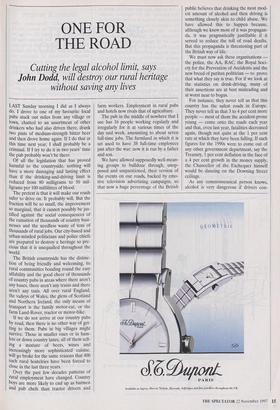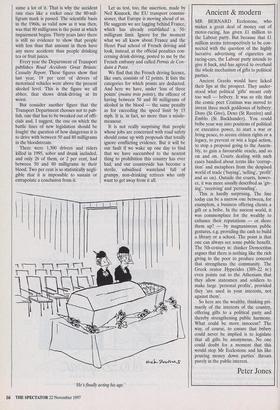ONE FOR THE ROAD
Cutting the legal alcohol limit, says
John Dodd, will destroy our rural heritage
without saving any lives
LAST Sunday morning I did as I always do. I drove to one of my favourite local pubs stuck out miles from any village or town, chatted to an assortment of other drinkers who had also driven there, drank two pints of medium-strength bitter beer and then drove home again. If I do that at this time next year, I shall probably be a criminal. If I try to do it in two years' time the pub probably won't be there.
Of all the legislation that has proved harmful to the countryside, nothing will have a more damaging and lasting effect than if the drinking-and-driving limit is reduced from 80 milligrams to 50 mil- ligrams per 100 millilitres of blood.
The pretext is that it will make our roads safer to drive on. It probably will. But the fraction will be so small, the improvement so marginal, that it cannot possibly be jus- tified against the social consequences of the ruination of thousands of country busi- nesses and the needless waste of tens of thousands of rural jobs. Our city-based and urban-minded politicians and police chiefs are prepared to destroy a heritage so pre- cious that it is unequalled throughout the world.
The British countryside has the distinc- tion of being friendly and welcoming, its rural communities bonding round the easy affability and the good cheer of thousands of country pubs in areas where there aren't any buses, there aren't any trains and there aren't any taxis. All over rural England, the valleys of Wales, the glens of Scotland and Northern Ireland, the only means of transport is the family motor-car, or the farm Land-Rover, tractor or motor-bike.
If we do not arrive at our country pubs by road, then there is no other way of get- ting to them. Pubs in big villages might survive. Those in smaller ones or in ham- lets or down country lanes, all of them sell- ing a mixture of beers, wines and increasingly more sophisticated cuisine, will go broke for the same reasons that 400 such rural hostelries have been forced to close in the last three years.
Over the past few decades patterns of rural employment have changed. Country boys are more likely to end up as barmen and pub chefs than tractor drivers and farm workers. Employment in rural pubs and hotels now rivals that of agriculture.
The pub in the middle of nowhere that I use has 16 people working regularly and irregularly for it at various times of the day and week, amounting to about seven full-time jobs. The farmland in which it is set used to have 38 full-time employees just after the war; now it is run by a father and son.
We have allowed supposedly well-mean- ing groups to bulldoze through, unop- posed and unquestioned, their version of the events on our roads, backed by emo- tive television advertising campaigns, so that now a huge percentage of the British public believes that drinking the most mod- est amount of alcohol and then driving is something closely akin to child abuse. We have allowed this to happen because, although we knew most of it was propagan- da, it was pragmatically justifiable if it served to reduce the toll of road deaths. But this propaganda is threatening part of the British way of life.
We must now ask these organisations the police, the AA, RAC, the Royal Soci- ety for the Prevention of Accidents and the new breed of puritan politician — to prove that what they say is true. For if we look at the statistics on drink-driving, many of their assertions are at best misleading and at worst near to bogus.
For instance, they never tell us that this country has the safest roads in Europe. They never tell us that 3 to 4 per cent more people — most of them the accident-prone young — come onto the roads each year and that, even last year, fatalities decreased again, though not quite at the 1 per cent rate at which they have been falling. If such figures for the 1990s were to come out of any other government department, say the Treasury, 1 per cent deflation in the face of a 4 per cent growth in the money supply, the Chancellor of the Exchequer himself would be dancing on the Downing Street ceilings.
As any commonsensical person knows, alcohol is very dangerous if drivers con- sume a lot of it. That is why the accident rate rises like a rocket once the 80-mil- ligram mark is passed. The scientific basis in the 1960s, as valid now as it was then, was that 80 milligrams is the point at which impairment begins. Thirty years later there is still no evidence to show that people with less than that amount in them have any more accidents than people drinking tea or fruit juices.
Every year the Department of Transport publishes Road Accidents Great Britain: Casualty Report. These figures show that last year, 19 per cent of drivers of motorised vehicles were above the present alcohol level. This is the figure we all abhor, that shows drink-driving at its worst.
But consider another figure that the Transport Department chooses not to pub- lish, one that has to be tweaked out of offi- cials and, I suggest, the one on which the battle lines of new legislation should be fought: the question of how dangerous it is to drive with between 50 and 80 milligrams in the bloodstream.
There were 1,300 drivers and riders killed in 1995, sober and drunk included, and only 26 of them, or 2 per cent, had between 50 and 80 milligrams in their blood. Two per cent is so statistically negli- gible that it is impossible to sustain or extrapolate a conclusion from it. Let us test, too, the assertion, made by Neil Kinnock, the EU transport commis- sioner, that Europe is moving ahead of us. He suggests we are lagging behind France, which has already established a 50- milligram limit. Ignore for the moment what we all know about France and the Henri Paul school of French driving and look, instead, at the official penalties con- cerning drink-driving, posted to me by the French embassy and called Permis de Con- duire a Point.
We find that the French driving licence, like ours, consists of 12 points. It lists the categories for which points are deducted. And here we have, under 'loss of three points' (moins trois points), the offence of having between 50 and 80 milligrams of alcohol in the blood — the same penalty as for exceeding the speed limit by 15 mph. It is, in fact, no more than a misde- meanour.
It is not really surprising that people whose jobs are concerned with road safety should come up with proposals that totally ignore conflicting evidence. But it will be our fault if we wake up one day to find that we have succumbed to the nearest thing to prohibition this country has ever had, and our countryside has become a sterile, subsidised wasteland full of grumpy, non-drinking retirees who only want to get away from it all.
He's finally acting his age.'



















































































 Previous page
Previous page